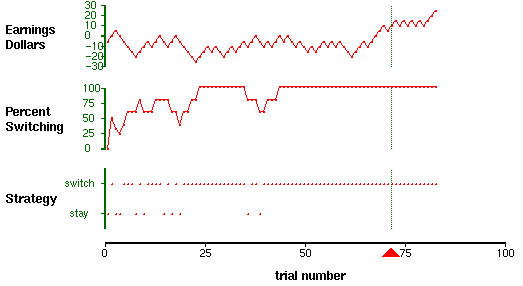The Three Doors of Serendip:
"Hands on" Understanding, continued
"Hands on" Understanding, continued



"Hands on" Understanding, continued |    |
| Door image from http://www.woodstone.com/photoalbum7.html |
 . And even if you know how to do it and can tell someone else, WHEN did you come to that understanding? Perhaps your experience was like that shown in the figure? Notice that the player in this case actually started making money, started winning more often than losing, started using the best winning strategy well BEFORE (location of the red triange) clicking the button to indicate understanding of how to win.
. And even if you know how to do it and can tell someone else, WHEN did you come to that understanding? Perhaps your experience was like that shown in the figure? Notice that the player in this case actually started making money, started winning more often than losing, started using the best winning strategy well BEFORE (location of the red triange) clicking the button to indicate understanding of how to win.
Clearly "understanding" something, in the sense of behaving in relation to it in an appropriate way can be something different from "understanding" it in the sense of being able to put something into words or describing it to someone else. Moreover, one can "understand" in the first sense without necessarily even being aware that one understands. Understanding, of this kind, may be unconscious, and is expressed in action, rather than in coherent thoughts or words.
How can THAT be? How can one have understanding without knowing where one got it, or even that one has it? Doesn't that require belief in spirits, or supernatural beings, or extrasensory perception? No, actually it doesn't. All that it requires is that one understand that the human brain functions in two distinct modes: one is "conscious" and the other is "unconscious". The latter is not (at least not necessarily) the demon-filled box that you may think of in connection with Freud. It is instead a quite ordinary, down to earth, material part of brain function which actually has quite sophisticated analytical powers, in some areas at least probably better than those associated with conscious processing. That part of the brain is fully capable of noticing that some actions you take yield better outcomes than other actions, and hence figuring out which actions are better for you. It is also quite capable, if you let it, of taking those actions. All that it doesn't do is to tell the other part of the brain, the conscious part, why its doing what its doing.
Interesting idea, huh? That one can "understand", even "learn" without knowing how one understands/learns? Several philosophers have written about it in the past, a number of psychologists (other than Freud) study it, and, in recent years, some very good neurobiologists have been exploring it in terms of the anatomy and physiology of the brain. If you'd like to find out more about it, follow some of the links given below.
For present purposes, the important point is that unconscious/intuitive understandings are real. People DO know things without knowing how they know them, and may know them without even knowing that they do, much less being able to explain to others what they know and how they know it. That they can't do THOSE things doesn't necessarily mean they don't understand, or shouldn't be payed attention to. It does, though, mean that its hard for other people to make use of the understandings, a point whose significance we will return to.
One other point is important too. Unconscious/intuitive understandings, like conscious understandings, can have their origins in one's experiences (even if one doesn't know they did). That's why we don't have to presume the existence of spirits or supernatural beings or extrasensory perception to account for them. Is it possible to have unconscious/intuitive understandings that don't derive from one's own experiences? The answer is yes, but those don't necessarily require contact with a "deeper reality" either. The brain's organization and function reflects a complex blend of genetic information together with individual experiences. And that genetic information can itself produce unconscious/intuitive understandings. Even though you didn't yourself have particular experiences, your ancestors did ... so we have a way to account in terms of experiences for unconscious/intuitive understandings even if the relevant experiences didn't happen to you personally. There are some links below that will let you let more about that too if you like.
Polanyiana, the periodical of the Michael Polanyi Liberal Philosophical Association, from Hungary
 |
 |
 |
|
"Hands on" understanding intuitive, unconscious | "Experimental" understanding conscious, observational | "Rational" understanding conscious, analytical, logical |